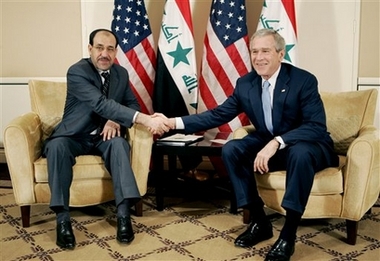Bush, Iraqi PM al-Maliki meet in Jordan
(AP)Updated: 2006-11-30 14:26
A senior administration official, who spoke with US Ambassador to Iraq Zalmay Khalilzad, essentially echoed Bartlett's account.
|
The Jordanians and the Iraqis jointly decided it was not the best use of time because they both would be seeing the president separately, the official said.
Members of the Jordanian and Iraqi delegations contacted Khalilzad, who called Air Force One and spoke with Bush and Secretary of State Condoleezza Rice, giving them a heads-up, the official said.
However, Redha Jawad Taqi, a senior aide of top Shi'ite politician Abdul-Aziz al-Hakim who also was in Amman, said the Iraqis balked at the three-way meeting after learning the king wanted to broaden the talks to include the Israeli-Palestinian conflict.
Two senior officials traveling with al-Maliki, who spoke on condition of anonymity because of the sensitivity of the information, said the prime minister had been reluctant to travel to Jordan in the first place and decided, once in Amman, that he did not want "a third party" involved in talks about subjects specific to the US-Iraqi relationship.
With al-Maliki already gone from the palace, Bush had an abbreviated meeting and dinner with the king before heading early to his hotel.
The cancellation came after the disclosure of a classified White House memo, written Nov. 8 by Hadley. In one particularly harsh section, Hadley asserted: "The reality on the streets of Baghdad suggests Maliki is either ignorant of what is going on, misrepresenting his intentions or that his capabilities are not yet sufficient to turn his good intentions into action."
Administration officials did not dispute the leaked account. But they said that, on balance, the document was supportive of the Iraqi leader and generally portrayed him as well-meaning.
The president "has confidence in Prime Minister Maliki," said Bush spokesman
Tony Snow. He added that al-Maliki "has been very aggressive in recent weeks in
taking on some of the key challenges."
 | 1 | 2 | 3 |  |
|
||
|
||
|
|

